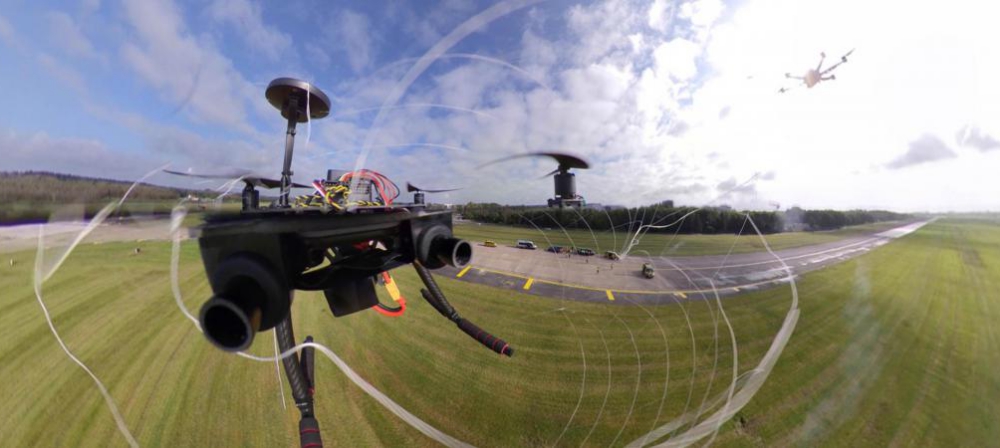On 22 September, the interception of a non-cooperative drone was successfully demonstrated for the first time in a field test at Hamburg Airport as part of the FALKE project, funded by the BMVI (Federal Ministry of Transport and Digital Infrastructure).
The unauthorised intrusion of drones or Unmanned Aerial Systems (UAS) into control zones means an increasing threat to the operation of commercial airports. The responsible parties at the airport are faced with the challenge of quickly detecting and reacting to the illegal entry of these small and agile flying objects in order to minimise any impact to airport operations.
Using the example of Hamburg Airport, the consortium partners of the “FALKE” project are developing and demonstrating their overall technical and organisational concept for the defence against illegally operating drones. FALKE provides an automated and standardised solution that can also be used at other German airports, considering all areas of competence and responsibility. In addition to the Frequentis Group, the German Federal Police, DFS, Lufthansa, Hamburg Airport, the Hensoldt Group, and the Professorship for Electrical Measurement Technology at the Helmut Schmidt University (HSU) Hamburg are involved in the project.
FALKE uses the most modern detection technologies and links their data with those of the existing infrastructure. This creates an innovative airborne defence system, making it possible to react immediately to unauthorised drone intrusions and eliminate the cause of the disruption.
The Frequentis Groups cloud-based concept processes a clear depiction of the air situation from the available data and distributes it to all parties involved, which includes organisational units of the airport, ATC, airlines, and the police, in real time. Particular attention is paid to a consistent and up-to-date presentation, tailored to the diverse needs of all users.
The applied system components, market proven and widely used in ATC and state-wide airspace security, ensure that an alarm is triggered immediately in case of a drone incident. The ongoing and effective algorithmic merging of the available data avoids costly downtimes caused by false alarms.
The defense technology, supported by Artificial Intelligence (AI), not only ensures an immediate reaction to a critical situation, but also supports law enforcement officers in securing evidence. The airport operator has all of the information needed at hand to remove foreign objects from the area of operation and to be able to resume operation immediately. ATC receives feedback from all parties involved in real time and can therefore resume operations without unnecessary delays.
At FALKE, the Frequentis Group brings proven components from the areas of Unmanned Traffic Management (UTM), Air Traffic Management (ATM), drone detection, data fusion and exchange, shared understanding of the situation and surveillance data automation in ATM quality, and cross organisational incident and crisis management (ICM).
The BMVI is providing more than € 2 million of funding to the FALKE project as part of the call for ideas and funding for unmanned aviation applications from 2019.
Source: Press Release

